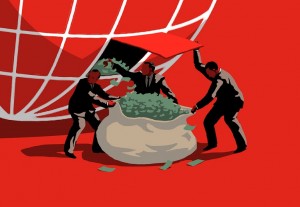The Scourge of Corruption
Shamshad Ahmad
Corruption is today an endemic problem of our times, afflicting all societies and countries regardless of the levels of their social and economic development or the type of their political system. It has become a global challenge with far-reaching social and economic consequences warranting comprehensive remedial strategies both at national and global levels not only to fight this evil but also to establish voluntary standards of behaviour and legal mechanisms to curb and control the causes and effects of corrupt practices.
What do we mean by corruption? The term “corruption” is generally applied to situations or acts of dishonesty, particularly the behaviour on the part of officials in the public sector, whether politicians or civil servants in which they ‘improperly and unlawfully enrich themselves or those close to them by the misuse of “public power or property” entrusted to them. In its essence, corruption is the abuse of entrusted power for personal gain or for the benefit of a group to which one owes allegiance.
Every year, on 9th December, “World Anti-Corruption Day” is observed to mark the adoption of the UN Convention against Corruption in 2003 as “the first legally binding global response” to growing corruption all over the world. It now constitutes a major instrument of international cooperation in every aspect of the “global fight against corruption”, including prevention, investigation, and prosecution of offenders.
It obliges countries to criminalise not only the basic forms of corruption such as bribery and embezzlement of public funds but also money laundering and overseas concealment of corruption money. The prevention campaign involves generating public awareness of corruption and the remedial measures with the help of non-governmental organisations and relevant parts of civil society. Corruption is a major cause of poverty as well as a barrier to overcoming it. This scourge must be vigorously addressed if people are to be freed of poverty.
According to World Bank estimates, each year, in both developed and developing countries, over $1 trillion is paid in bribes. Foreign investment is always lower in countries perceived to be corrupt, which further thwarts their chance to develop and prosper. No wonder, corruption hampers economic growth and development. It also constitutes the main source of capital flight from developing countries with their rulers and public office-holders as well as privileged elites making huge transfers of illicit funds through money laundering to be stashed away in foreign countries.
But corruption cannot be measured in economic terms alone. It debilitates the judicial and political systems, aggravating political instability, distorting judicial and electoral processes, perverting the rule of law, and creating bureaucratic quagmires whose only reason for existence is soliciting of bribes. As a result, citizens lose trust in government officials and national institutions. In the political realm, it undermines democracy and good governance by flouting or even subverting formal processes.
Corruption in elections and in legislative bodies reduces accountability and distorts representation in policymaking; corruption in the judiciary compromises the rule of law; and corruption in public administration results in the unfair provision of services. More generally, corruption erodes the institutional capacity as procedures are disregarded, resources are siphoned off, and public offices are bought and sold. No wonder, where corruption is galore, society at large suffers.
Corruption is not a natural calamity or disaster; it is simply a cold-blooded theft of opportunity from the men, women and children who are least able to protect themselves. Besides its wide-ranging deleterious effects on society and governance, it’s most deadly impact is always on the poor. Transparency International (TI) brings out an index every year based on a composite global survey reflecting the “perceptions” of business people and country analysts drawn on numerous polls conducted by independent institutions
In our own country, corruption has been a major problem from the very beginning of our independent statehood. In his address to the Constituent Assembly on 11 August 1947, Quaid-i-Azam had warned us against what he called the ‘evils’ of bribery, corruption, black-marketing, nepotism and jobbery. He wanted the government and the Assembly to curb these evils with an iron hand. We as a nation, however, have not only failed to grapple with these challenges but are in fact living with them as an integral part of our society.
Corruption is endemic to all segments of our society. Justice is inaccessible, slow and selective, encouraging contempt for the rule of law. Crime and corruption are rampant and galore both in scope and scale. Aversion to the rule of law is endemic. Poor governance is our national hallmark. The national integrity system and its institutional mechanisms inspire no confidence among the people. Political institutions and civil society are weak and ineffective. All these shortcomings need remedial action at appropriate levels.
Pakistan’s National Accountability Bureau was established to combat corruption in our state system. With a well-defined legal mandate and operational framework, NAB has no doubt, been functioning against heavy odds because of our systemic aberrations, failures of governance, political compulsions and resource limitations. In its anti-corruption strategy, NAB has identified many causes as the genesis of corruption in Pakistan. These include the problems that we inherited at the time of our independence.
Our legacy consists of economic difficulties, systemic aberrations, political instability, administrative and judicial inadequacies. Forms of corruption in Pakistan also vary but the most common are abuse of public office, patronage, graft, bribery, extortion, influence peddling, nepotism, fraud and embezzlement. We are today the classic example of ingenuities for bribery, exchange of favours and illegitimate perquisites. In our politics, electoral extravagance, kickbacks, defaulting bank-loans and soft money constitute a common form of corruption.
There is something fundamentally wrong with our patterns and standards of governance. In fact, too much of governmental role in everyday life of citizens is a major factor of power abuse. Corruption is most prevalent in our elitist political system, which is dominated by politicians from the feudal or affluent business classes. The difficulties and sufferings of the poor and the underprivileged, on the other hand, remain unabated. They are burdened with liabilities that normally belong to the state.
Parents pay teachers illegal fees to have their children educated, patients pay extra to get proper healthcare, citizens give public officials “gifts” or money to speed up procedures, and drivers bribe police officers to avoid fine. What many see as simply a way to get things done is, simply and in fact, nothing but a crime. Ironically, while the common man in our country suffers hardship, the known looters, profiteers and hoarders could not enjoy safer haven anywhere else in the world.
No other country is familiar with the practice of forgiving as a matter of rule the elite loan-defaulters and the known highly placed plunderers of the national exchequer. In no other country are the privileged ones so brazenly above the law. To make things even worse, the notorious NRO illegality has become a new doctrine of necessity for our corrupt elites and is reigning supreme in our country. No wonder, Transparency International’s latest CPI (2018) shows no improvement in Pakistan’s global ranking.
Despite the change of government, Pakistan’s CPI ranking remains 117 out of 180 countries, the same as in 2017. To improve its overall ranking in global lists, Pakistan will not only have to control corruption in all segments of its society but also improve its GDP growth rate. The system that breeds corruption, tax evasion, kleptocracy, abuse of power, lavish governmental spending, a VIP culture, violence and lawlessness must be rooted out from our body politic.
 Jahangir's World Times First Comprehensive Magazine for students/teachers of competitive exams and general readers as well.
Jahangir's World Times First Comprehensive Magazine for students/teachers of competitive exams and general readers as well.





